The article was originally published on Expressen. Dagbladet translated and reproduced the entire article. We also caution against strong images.
Mikulajiv (Expressen): Expressen counts about thirty kills being taken out of the smoking crowd. The port city became one of the front lines against Putin’s invasion.
– My bones! The soldier screams from my legs in pain as he is taken out of the ambulance. His clothes are torn, wet and bloody. But he is alive.

Digging into the crowd: A soldier has been struggling to recover both the living and the dead since Friday morning. Photo: Niklas Hammerström/Expressen
Show more
The military base is located inside Mykolachev on the Black Sea. Cohesion is the lock that Russia did not manage to break on the path of a full-scale war against Odessa.
And since Russia does not succeed in capturing the city with its ground crews, they expose it daily to air strikes. At the Black Sea, the war of conquest takes the form of a missile and air war.

– Not the whole world “punch”
Five bombs fell
The city awoke at 6 a.m. Friday to deep thunder and explosions, after falling asleep to the sound of similar explosions around midnight. Two Russian fighter jets dropped what appeared to be five bombs on a military barracks in the Sulyani neighborhood.
Glass scattered everywhere. I prayed to God to be able to get to safety before there were more bombs. There are always more bombs, says Private Nikita, who has fully recovered from the attack and is now looking at the flames and smoke.
– Physically at least, adds the 22-year-old.

Many dead: Sirhi, one of those who survived the attack, told Expressen that 90 percent of them died. Photo: Niklas Hammerström/Expressen
Show more
He stood a little alongside some of the other comrades who also survived. Nikita has not yet announced to his family that he is alive. He says he doesn’t want to bother them yet. But above all, he still seems to take into account what is happening around him.
– We just want to end this, says his friend David (18).

Last message: – Intense bombing!
piles of corpses
An officer tells them to go a little further for fear of more explosions.
Soldiers, all working very silently, carry boxes of ammunition and anti-tank weapons away from the fire.
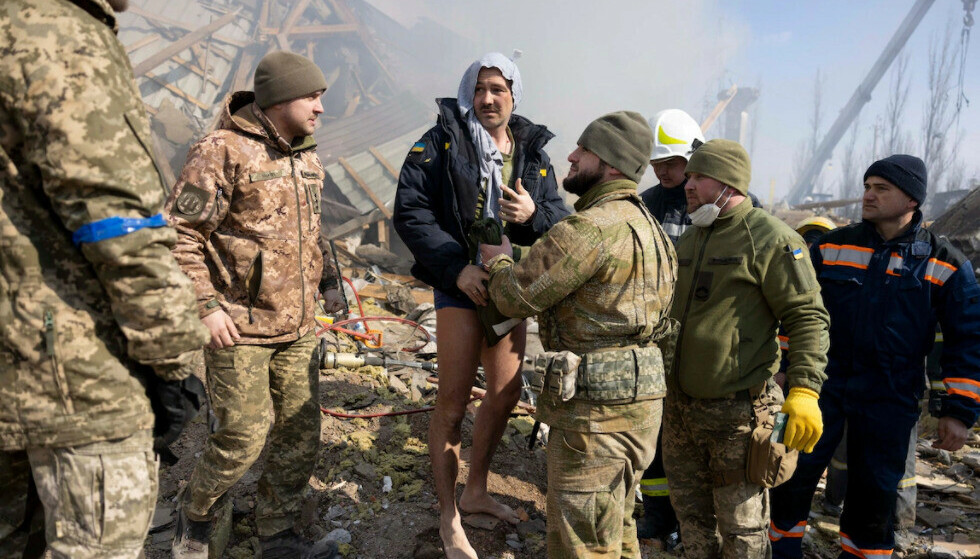
Survivors: A man who survived the attack appeared in the rubble on Friday. Photo: Niklas Hammerström/Expressen
Show more
Burned corpses lying on the ground. Entire bodies, more or less intact, are set aside as rescuers take them out of the masses. The dead seem real to varying degrees. The discarded body is gray as the cement it is dug into.
After a few hours, a tent was erected to be used as a stretcher. Soldiers and civilian volunteers carry body after body out of landslides. After seven hours in the cold and complete darkness, another person comes out alive: Alexander.
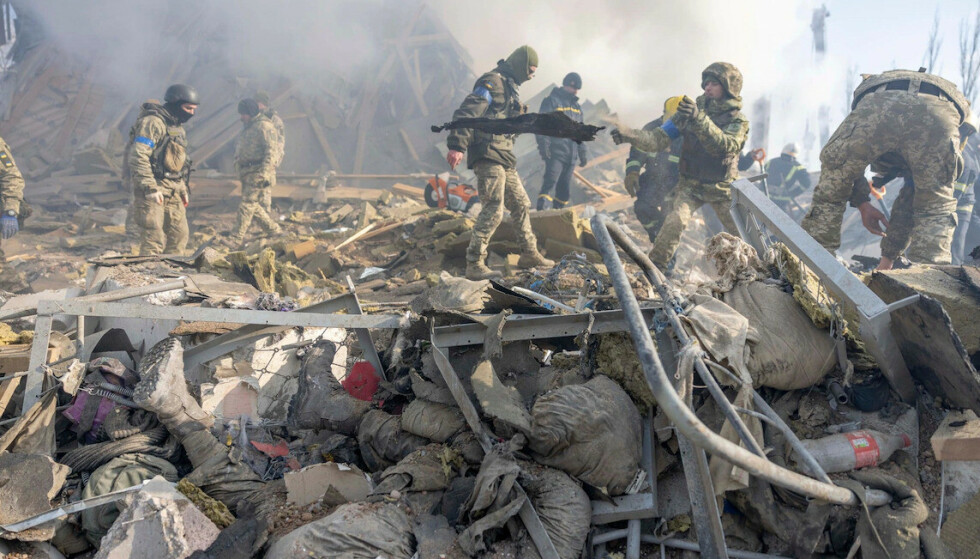
Big mission: Since the bombs fell Friday morning, soldiers and volunteers have been searching for the dead and dead in the rubble. Photo: Niklas Hammerström/Expressen
Show more
The 27-year-old can walk alone.
– We were about 52 pieces in the basement. He says I don’t know how many survived.
Behind him is an old man carrying a stretcher. He is shivering and appears to be in shock.
– No, no bandage! He told the hospital staff that I don’t bleed much.

Reminds us of Stalin
Alexander, the survivor, looks at the soldier. He also seems to be following his adrenaline and won’t sit, eat, or drink. Instead, he fiddles with his cell phone. He is unsure whether he should contact his parents who live in Kherson, in the gray zone between Russian and Ukrainian forces.
Alexander says he intends to continue the fight as soon as possible – despite what he has just gone through.
– But the Russians will not fight with us on the ground. So far, I’ve only been in a fight on the hill with them three times. They’d rather send missiles and aerial bombs instead, he says with some hidden bitterness.
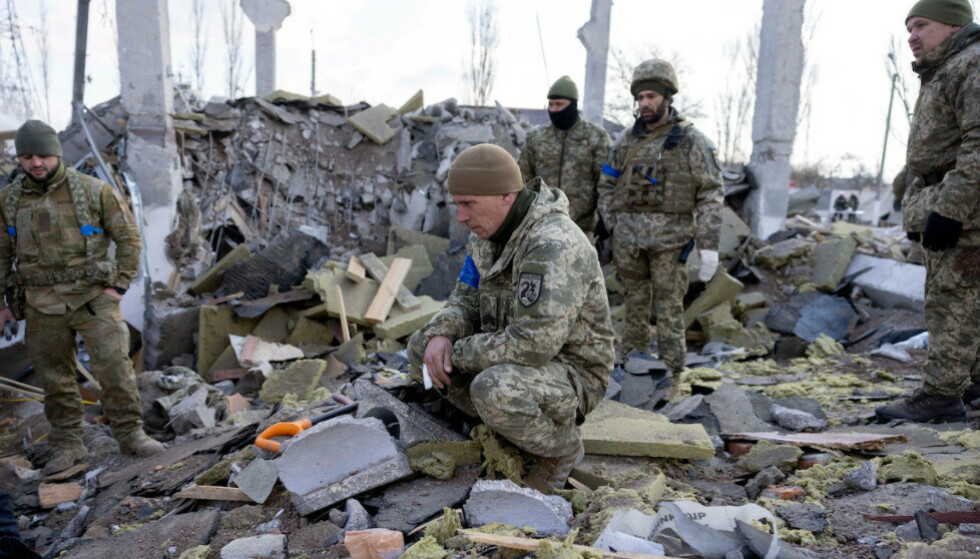
200: There were 200 people in the building when the Russians attacked. Photo: Niklas Hammerström/Expressen
Show more
– Let this war end
A little later, many soldiers survived the bombing. One of them, who does not want to be named, gives his explanation for the attack.
– The Russians know that we do not use air defense here in the city where civilians live. That’s why they’re bombing us here, he says.

The city with a beautiful heart
Like everyone else in town, rescue worker Antonia was also awakened by the sound of thunder and thunder.
– It’s been like that for weeks. I just thought it was going to be a long day and a lot of work, says the woman in red.
Her whole face expresses exhaustion. She was born in Mykolaiv and has two sons in the army, one in her hometown and the other on another front.
– To end this war, she sighs.
She says Ukraine will win in the end. But she says it without joy.
digging up the living
In Mykolaiv there is almost complete support in the defense against the forces of the Russian invasion. On every street corner are piles of tires and Molotov cocktails ready to be lit should the Russians enter the city.
The cityscape is characterized by sandbags, tank parapets, and concrete blocks. At the same time, residents manage to keep the city alive with electric trams, electricity and water – although not always hot water.
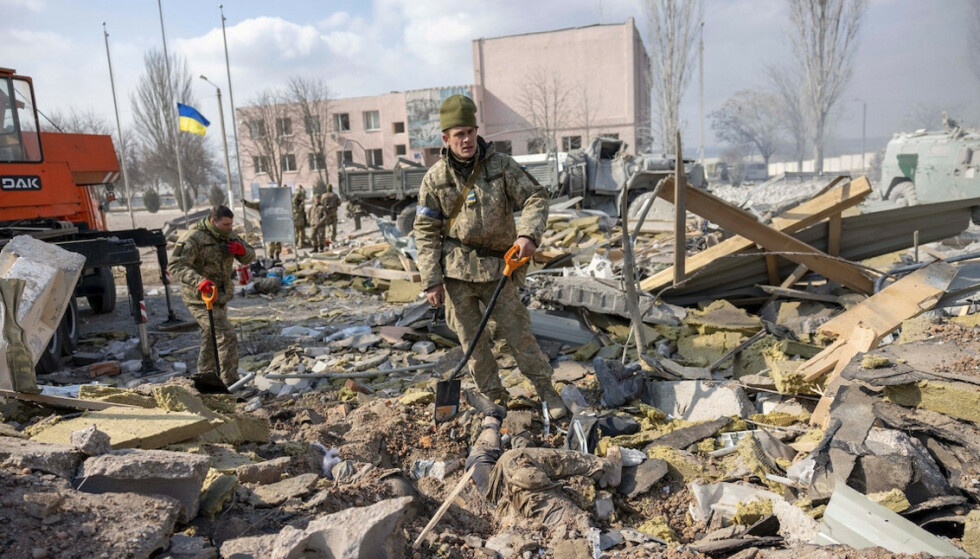
The Great Desolation: On the ground around the ruins of the military base there are many personal belongings, such as shoes and a card with a picture of Jesus. Photo: Niklas Hammerström/Expressen
Show more
Every day Mykolachev is bombed, and every day the city is being reformed. When the mayor warns that they need more blood, there will be long lines of blood donors the next day.
In the barracks in the northern parts of Mykolachev, rescue workers line up alongside ambulance personnel and firefighters amid the icy morning winds. On the floor are personal belongings, such as shoes and cards with images of Jesus.
Volunteers flock in and out of town. Among those who form a human chain to remove concrete blocks and scrap, there are volunteers from the United States, Great Britain and Italy.
“I’m really not here,” says a secret Texas Englishman.
– An orphanage was bombed
There is now a strip outside on the banks of the Bug River from Voznesensk to Kherson and the Black Sea in the south, which is bombarded by the Russian rug.
At the same time that the barracks in Mikolajev were bombed by planes, similar things happened nine miles north of Voznesensk.
– Here in Voznesensk, the Russians bombed an orphanage, a boarding school and even a swimming pool in our city, said Mayor Yergin Velichko by phone.
Among the surviving soldiers in Mykolaiv was Serhiy. The 54-year-old, dressed in a dark leather jacket and a wrinkled face, has, according to him, witnessed countless similar scenes since 2014, when the war began for him:
– I slept in the opposite barracks. He says the pressure wave threw us around each other.
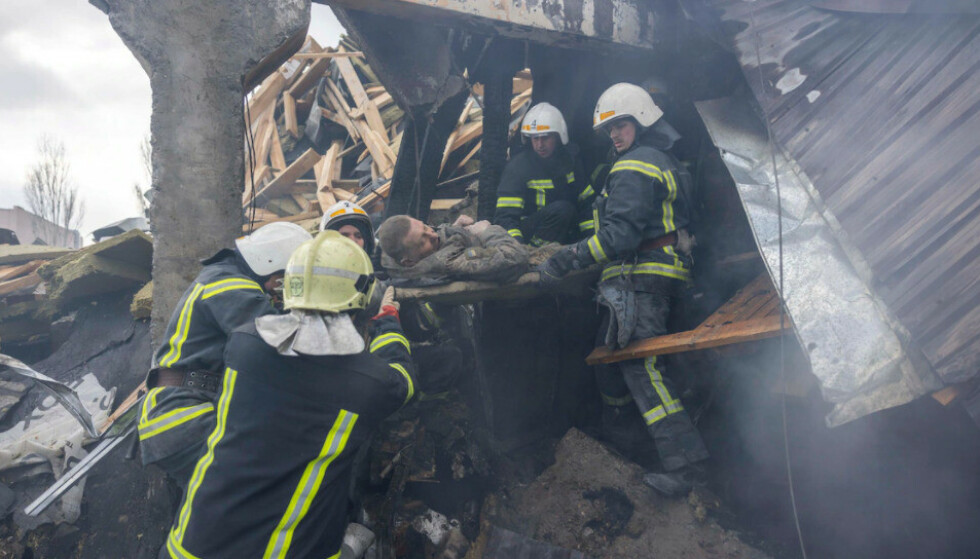
Many help: volunteers pour in, from the city and from abroad. Among those building a human chain to remove conditional blocks and scrap are volunteers from the United States, the United Kingdom and Italy. Photo: Niklas Hammerström/Expressen
Show more
His eardrums got a real buzz:
– But I’ve had problems with them since 2014, says Serhiy, looking at the burning rubble.
“Of the 200 that were probably out there, I can guess 90 percent didn’t survive,” he says seriously.
According to a representative of the hospital, 40 wounded are treated in the afternoon, with 15 operations in two hours. Five people with uncertain results.

War brings out the best – and the worst
– What are you missing?
– weapons.
After a few hours of digging with machines and bare hands, another miracle emerged from the crowd: a living man, barefoot and in his underwear.
“There, there must be one, and then two more,” says the officer, bitterly softly.
The men continue digging while pushing the crane forward.
The survivor is then carried away among the corpses and shards of glass while still barefoot. To the outside world, he has only one message:
Close the sky Close the sky.

“Organizer. Social media geek. General communicator. Bacon scholar. Proud pop culture trailblazer.”

